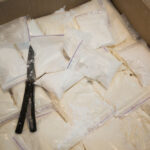What is the Knowledge Requirement for Drug Importation in Australia?

The Australian Federal Police arrested a man at Melbourne International Airport last week, over allegations he attempted to import 6 kilograms of heroin concealed in his luggage.
The 67-year old Canberra resident was returning from a trip to Manila, Thailand when he was stopped on arrival in Melbourne on 17 October 2023 by officers from the Australian Border Force (ABF) after anomalies were detected during an X-ray scan of his suitcase and two handbags.
A physical search allegedly resulted in the detection of white powder in the lining of all three items.
A presumptive test which followed is said to have registered a positive indication to heroin.
The man was subsequently arrested and charged with importing a commercial quantity of a border controlled substance.
He faced Melbourne Magistrate’s Court the next day, where he was refused bail and remanded in custody until his next court date on 18 January 2024.
The offence of commercial drug importation is serious and attracts a maximum penalty of life imprisonment.
However, it is important to be aware that in order to establish the offence, the prosecution must prove not only that the drugs were physically imported or there was an attempt to import them, but also that the person against whom the charges are brought had the relevant knowledge and intention to import the substances.
Here is an outline of the offence of drug importation in Australia, with a particular focus on the mens rea – also known as the mental or knowledge requirement – that the prosecution must prove beyond a reasonable doubt before a person can be found guilty.
Offences related to drug importation
The offence colloquially known as ‘drug importation’ is formally known as importing or exporting a border controlled drug.
The offence applies to a broad range of substances that are listed in the Criminal Code Act 1995 (a piece of legislation that applies across Australia) and include various amphetamines including methylamphetamines and MDMA (ecstacy), opioids such as heroin and opium, stimulants such as cocaine and many dozen others.
The Criminal Code Act prescribes different penalties depending on the type and weight of the substance, and the offences that apply are contained in sections 307.1 of the Act (commercial quantity), 307.2 of the Act (marketable quantity) and 307.3 of the Act (any quantity).
To be found guilty of drug importation, the prosecution must prove beyond a reasonable doubt that a person:
- Imported a border controlled drug and
- Intended to import the substance, and
- Knew, or was reckless as to whether, the substance was a border controlled drug.
The Act also contains a provision which means an attempt to import will suffice.
The term ‘import’ includes bringing the substance into Australia, as well as dealing with the drug in connection with its importation.
The relevant quantities for some of the most frequently detected border controlled drugs are:
Border Controlled Drug |
Marketable Quantity |
Commercial Quantity |
| Cannabis (dried leaf) | 25kg | 100kg |
| LSD | 0.002g | 2g |
| MDMA | 0.5g | 500g |
| Methamphetamine | 2g | 750g |
| Cocaine | 2g | 2kg |
| Heroin | 2g | 1.5kg |
The maximum penalties for importation offences are:
- 10 years imprisonment for importing less than a marketable quantity of a border controlled drug under section 307.3 of the Code
- 25 years imprisonment for importing more than a marketable quantity of a border controlled drug but less than a commercial quantity under section 307.2 of the Code
- Life imprisonment for importing a commercial quantity of a border controlled drug or more under section 307.1 of the Code.
Intention to import a border controlled drug
The mental fault element for importation offences under the Code is an intention to import a border controlled drug.
The leading authority in that regard is High Court case of He Kaw Teh v The Queen (1985) 157 CLR 523, which made clear that in order to establish the mental element of a drug importation offence, the prosecution must prove beyond reasonable doubt the person had an intention to import a border controlled drug.
In He Kaw Teh, the accused was convicted for two offences related to the possession and importation of 2.78 kilograms of heroin.
The accused maintained at trial that he was unaware that heroin was in his possession, claiming it must have been planted in his luggage, and hence he should not be liable.
The court at trial concluded that importation offences were strict liability offences, and therefore the prosecution did not need to prove an intention to import heroin. However, onn appeal to the High Court, this decision was overturned, with the majority finding that in matters of significant criminality, there is a presumption that prosecutors must establish an intent to bring about the criminal act.
In Kural v The Queen (1987) 162 CLR 502, the High Court clarified that an intention to import a border controlled drug will be proven if an accused had sufficient knowledge that the thing they imported was a border controlled drug. As the majority noted (at [3]):
[I]t is necessary to show an intention on the part of the accused to import a narcotic drug, that intent is established if the accused knew or was aware that an article which he intentionally brought into Australia comprised or contained narcotic drugs.
But that is not to say that actual knowledge or awareness is an essential element in the guilty mind required for the commission of the offence.
It is only to say that knowledge or awareness is relevant to the existence of the necessary intent.
Belief, falling short of actual knowledge, that the article comprised or contained narcotic drugs would obviously sustain an inference of intention.
So also would proof that the forbidden act was done in circumstances where it appears beyond reasonable doubt that the accused was aware of the likelihood, in the sense that there was a significant or real chance, that his conduct involved that act and nevertheless persisted in that conduct.
An intention to import a border controlled drug could therefore be proven by establishing actual knowledge of importing a border controlled drug, or being reckless as to whether or not a border controlled drug was being imported.
Under section 5.4 of the Criminal Code Act, a person is reckless to a circumstance if he or she was aware there was substantial risk of it existing and, having regard to the circumstances known to him or her, it was unjustifiable to take that risk but the person proceeded with their act or omission regardless.
In simple terms, recklessness may be established if the accused believed that the thing being imported was ‘likely’ a border controlled drug; Chi Thanh Cao v Regina (2006) 65 NSWLR, 172 A Crim R 1.
Jury directions on knowledge
Further decisions have clarified how a jury should be directed regarding the mental fault element for importation offences.
A jury should not been directed in terms of ‘wilful blindness’ – that is, there should be no reference to the idea that a person knew on some level that what was being imported was a border controlled drug and merely put it out of their mind: Zakaria (1992) 62 A Crim R 259. Instead, the jury should be direct that the prosecution must establish that the accused realised at least that there was a ‘real or significant chance’ that the packages he was importing were prohibited drugs: Smith v Regina [2016] NSWCCA 93.
In Smith v The Queen; The Queen v Afford [2017] HCA 19, the High Court suggested that the following jury directions be given in cases of importation of a border controlled drug ([69]):
(1) The accused is charged with importing a border controlled drug. Importing something into Australia means bringing that thing into Australia.
(2) What is in dispute is whether the accused intended to import the substance and whether he or she knew, or was reckless as to whether, the substance was a border controlled drug.
(3) The accused cannot be convicted of importing a border controlled drug unless it is established beyond reasonable doubt that:
(i) he or she intended to import a substance; and
(ii) he or she knew, or was reckless as to whether, the substance was a border controlled drug.
(4) Each of those mental elements must be considered separately.
(5) The accused cannot be regarded as having intended to do something unless it is established beyond reasonable doubt that he or she meant to do that thing.
(6) To decide whether the accused meant to bring the substance into Australia, it is permissible to draw an inference as to the accused’s state of mind at the time of bringing the substance into Australia.
(7) In order to draw an inference of intent, it is necessary to be satisfied beyond reasonable doubt of the facts and circumstances from which the inference of intent is drawn and that the inference of intent is the only reasonable inference open to be drawn from those facts and circumstances.
(8) Where, as here, the accused brought into Australia a case, object or other thing (“the container”) which has a substance in it, and it is open to infer that the accused meant to bring the container into Australia, it is open to infer that the accused meant to bring the substance into Australia if, at the time of bringing the container into Australia:
(i) the accused knew that the substance was in the container; or
(ii) the accused knew or believed there was a real or significant chance that the substance was in the container.
(9) It is not necessary that the accused knew or had a belief as to where, or in what fashion, or in what form, the substance existed or was secreted in the container. It is enough if the accused knew or believed there was a real or significant chance that the substance was somehow, somewhere, in some form within the container.
(10) It must be stressed once again, however, that it is not permissible to draw an inference that the accused meant to bring the substance into Australia unless that is the only inference reasonably open on the established facts and circumstances of the case.
(11) If it is established beyond reasonable doubt that the accused meant to bring the substance into Australia, it will then be necessary to decide whether the accused knew, or was reckless as to whether, the substance was a border controlled drug.
(12) The accused cannot be taken to have been reckless as to whether the substance was a border controlled drug unless it is established beyond reasonable doubt that:
(i) the accused was aware of a substantial risk that the substance was a border controlled drug; and
(ii) having regard to the circumstances which were known to the accused, it was unjustifiable for him or her to take the risk.
Knowledge of the quantity
Importantly, the mental fault element for importation offences does not include an intent to bring about a particular quantity of a drug. In the High Court decision of Cheng v The Queen, Gleeson CJ and Gummow and Hayne JJ note at [25] that:
A person may be knowingly concerned in the importation of heroin without knowing the quantity of heroin involved in the importation. In practice, many people who participate in the illegal importation of heroin would not know the quantity imported, and some would not even know the approximate quantity.
Such information may be concealed from them, or it may simply be unnecessary for them to have it.
In Keung, Bow, Liu v The Queen [2008] NSWCCA 193, a group of men who were found guilty of importing a commercial quantity of MDMA, appealed their convictions on the basis that the jury was not instructed that they must not merely have had intention to import a MDMA, but a commercial quantity of the drug. The NSW Court of Appeal, citing Cheng, rejected that proof of intending to important a particular quantity was required.
The doctrine of innocent agency
If a person does not have an intention to import a border controlled drug, they are sometimes referred to as an ‘innocent agent’.
The doctrine of innocent agency allows for criminal liability for the offence to extend to persons who didn’t commit the criminal act itself. The doctrine states that where one person (Person A) uses another, innocent, person (Person B) to commit an offence, Person A can be charged and convicted for the actions of Person B.
In the case of importation offences, this doctrine could apply where individuals plant drugs in an innocent person’s luggage for the purpose of importation.
Legal defences for importation offences
Along with raising the possibility that the accused did not intend to import a border controlled drug, a number of formal legal defences could also be raised.
The most common legal defence is duress, which is where you committed the offence because you were threatened that you, or someone close to you, would be seriously harmed.
Other available, but less common, defences include self-defence, necessity and mental illness.
Going to court for a drug offence?
If you are facing court over an allegation of importing a border controlled drug, call Sydney Criminal Lawyers anytime on (02) 9261 8881 to arrange a free first consultation with a specialist criminal defence lawyer who is vastly experienced in representing clients for drug charges and has a proven track record of producing exceptional outcomes.
Receive all of our articles weekly
Related Articles
RELATED LEGISLATION
- Section 307.1 Criminal Code Act 1995 | Importing or Exporting A Commercial Quantity of Border Controlled Drugs
- Section 307.2 Criminal Code Act 1995 | Importing or Exporting a Marketable Quantity of Border Controlled Drugs
- Section 307.3 Criminal Code Act 1995 | Importing or Exporting Border Controlled Drugs






